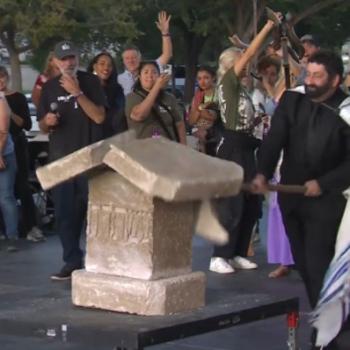John Fea directs us to an interview with Leonard Wieseltier, literary editor of The New Republic, in which Wieseltier explains why he doesn’t read blogs — and consequently explains why I don’t enjoy reading Leonard Wieseltier:
I have to say that there is not one blog, out of the eight million that must exist, that I read. The thing about blogging is that it is either someone’s first thoughts — which we know by definition are never their best thoughts — so that’s not interesting, or as time goes by they simply repeat themselves. Moreover there isn’t a lot you can say about anything consequential in 300 words. I write the back page of the magazine and I always wish it was three times as long as it is.
So here, then, is Wieseltier’s standard for “consequential” writing: Never say in 300 words what you can say, instead, in 1,500.
That explains a great deal about why his columns read the way they do.
“I have made this letter longer than usual,” Pascal once wrote, “because I lack the time to make it short.” Wieseltier seems to subscribe to the opposite point of view.
He’s also cheating himself. He wishes that his back-page column could be “three times as long as it is” because he has more to say than he can fit into that single page published 20 times a year. Wieseltier doesn’t seem to realize the obvious, common solution to that problem — take the best stuff that doesn’t fit and post it online.
But let’s just consider his assertion that “There isn’t a lot you can say about anything consequential in 300 words.” If that’s true, it should be hard to find any counter-examples.
Because I could not stop for Death,
He kindly stopped for me;
The carriage held but just ourselves
And Immortality.We slowly drove, he knew no haste,
And I had put away
My labor, and my leisure too,
For his civility.We passed the school, where children strove
At recess, in the ring;
We passed the fields of gazing grain,
We passed the setting sun.Or rather, he passed us;
The dews grew quivering and chill,
For only gossamer my gown,
My tippet only tulle.We paused before a house that seemed
A swelling of the ground;
The roof was scarcely visible,
The cornice but a mound.Since then ’tis centuries, and yet each
Feels shorter than the day
I first surmised the horses’ heads
Were toward eternity.
That’s only 128 words. Must not be consequential.
Congress shall make no law respecting an establishment of religion, or prohibiting the free exercise thereof; or abridging the freedom of speech, or of the press; or the right of the people peaceably to assemble, and to petition the Government for a redress of grievances.
Please — that’s only 45 words. That’s not even a blog post — it’s almost a Tweet. Clearly trivial.
Four score and seven years ago our fathers brought forth on this continent, a new nation, conceived in Liberty, and dedicated to the proposition that all men are created equal.
Now we are engaged in a great civil war, testing whether that nation, or any nation so conceived and so dedicated, can long endure. We are met on a great battlefield of that war. We have come to dedicate a portion of that field, as a final resting place for those who here gave their lives that that nation might live. It is altogether fitting and proper that we should do this.
But, in a larger sense, we cannot dedicate — we cannot consecrate — we cannot hallow — this ground. The brave men, living and dead, who struggled here, have consecrated it, far above our poor power to add or detract. The world will little note, nor long remember what we say here, but it can never forget what they did here. It is for us the living, rather, to be dedicated here to the unfinished work which they who fought here have thus far so nobly advanced. It is rather for us to be here dedicated to the great task remaining before us — that from these honored dead we take increased devotion to that cause for which they gave the last full measure of devotion — that we here highly resolve that these dead shall not have died in vain — that this nation, under God, shall have a new birth of freedom — and that government of the people, by the people, for the people, shall not perish from the earth.
That’s 268 words — almost, but not-quite, consequential.
We believe in one God, the Father, the Almighty, maker of heaven and earth, of all that is, seen and unseen.
We believe in one Lord, Jesus Christ, the only Son of God, eternally begotten of the Father, God from God, Light from Light, true God from true God, begotten, not made, of one Being with the Father. Through him all things were made. For us and for our salvation he came down from heaven: by the power of the Holy Spirit he became incarnate from the Virgin Mary, and was made man. For our sake he was crucified under Pontius Pilate; he suffered death and was buried. On the third day he rose again in accordance with the Scriptures; he ascended into heaven and is seated at the right hand of the Father. He will come again in glory to judge the living and the dead, and his kingdom will have no end.
We believe in the Holy Spirit, the Lord, the giver of life, who proceeds from the Father and the Son. With the Father and the Son he is worshiped and glorified. He has spoken through the Prophets. We believe in one holy catholic and apostolic Church. We acknowledge one baptism for the forgiveness of sins. We look for the resurrection of the dead, and the life of the world to come. Amen.
That’s only 226 words.
I guess it must be true, then, “There isn’t a lot you can say about anything consequential in 300 words.”
















